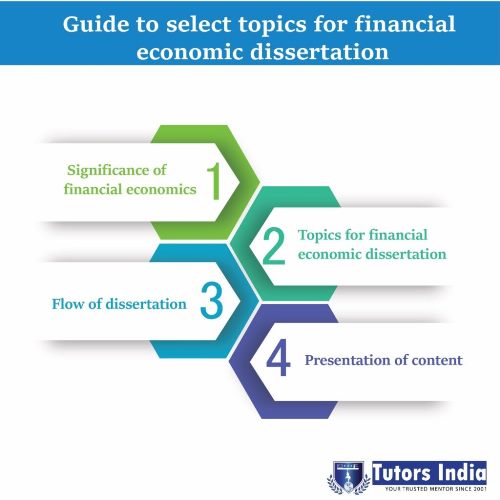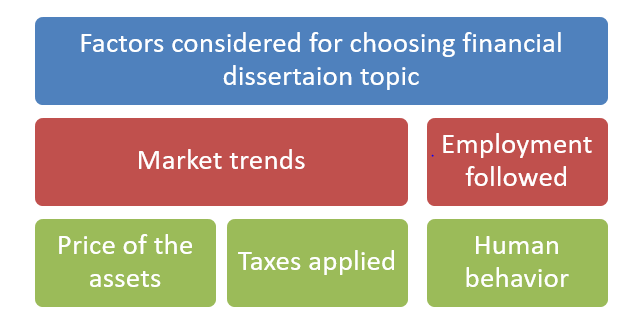Guide to select topics for Financial Economic Dissertation
Introduction
Financial economics can be defined as a branch of economics that includes different areas associated with financial and monetary issues, financial mathematics, exchange rates, financial markets and lots more[1]. Financial economics has been given importance as it can be helpful in developing methods and approaches related to finance and macroeconomics. These approaches can be further helpful in optimizing the interactions among the different stakeholders such as economists, bankers and financers[2]. The financial and macroeconomic data gathered by developing the databases and other econometric and mathematical tools has a major contribution in designing the financial interactions taking place around the globe[3].

Considering the significance of financial economics many candidates plan to complete their masters or other professional courses in this domain. This might be due to large area of research offered by this field[4]. However, while there are available plenty of topics in the field of financial economics, the level of complexity are higher.

Significance of Dissertation
Writing a dissertation has been a complicated task for the candidates pursuing masters, PhD or other professional courses. Though it is noteworthy that complexity of writing dissertation varies for the different type of courses, but at certain points they are similar. For example, the flow of dissertations, the presentation of the content etc. But when it comes to management or business part the things change completely. For example, for writing an economic dissertation one should be familiar with the economic conditions of the state. But before beginning writing dissertation it is of paramount significance to choose a trending or important topic[5]. Choosing a significant topic for dissertations is a vital task as success of entire dissertation is dependent on the uniqueness and relevance of the topic. Considering the significance of topics for economic dissertations, here some of the topics for financial economic dissertation have been mentioned.
- Analysis of the impact of the reactions of investor about the developing markets.
- Knowing about the phenomena of interest rate, different interest rates and its influence on the economy.
- The contribution of financial economics in academic industry.
- Influence of financial knowledge in provision methods.
- What is the extent of receptiveness for family firms to change?
- Allocating the capital to public institutions is based on economic or political decisions?
- Analyzing the investment policies of the company and knowing about their goals of growth.
- Knowing about the rationale for making decision about allocating the resources. Considering the organizational resources in UK.
- Contribution of social medial for accountability in democratic, semi-democratic and non-democratic economies.
- The gap between the theoretical and practical factors for credit rationing
- Role of the government investment companies in developing countries.
- Gathering information about price methodologies.
- Impact on the sentiments of investors due to natural disasters.
- Growth and identification of foreign investment in India.
- Contribution of unemployed but educated women in Indian economy.
- Contribution of IT sector in Indian economy.
- Significance of human capital in the performance of export.
- Financial services and Reserve Bank of India.
- Progress in the Indian Banking sector.
- Performance of the organization and relation between the employer and employee.
- Establishing the companies on international level.
Factors to be considered
Besides the above mentioned topics there are several other topics for planning dissertation for financial economics but these topics should be chosen on the basis of the current economic situation.

Figure 1 Factors to be considered for choosing financial dissertation topic
Some key aspects that should be considered while choosing financial economic dissertation topic are as follows:
- Choice of the candidate planning dissertation
- Consuming and producing
- Occupations adopted
- Employment followed
- Market trends
- Trade markets
- Price of the assets
- Taxes applied
- Human behaviour in making economic decisions
Summary
In this section, there have been discussed different aspects associated with financial economics such as choosing the topics for planning dissertation, factors to be considered while planning financial economic dissertation, significance of financial economics etc. However, while choosing topics for financial dissertation the candidate should consult with the guides or supervisors in-charge and plan their dissertations accordingly. Also it is necessary that the topic for the dissertations is planned in accordance with the recent advancements and progress in the economic state of the country. A topic decided for financial economics can also be of great significance if it is decided on the basis of some major issue occurring in the country that impacts the economic conditions. In some cases the candidate can seek funds from the agencies for their project.
References
[1] Del Río, M. L., Díaz-Vázquez, R. and Maside Sanfiz, J. M. (2018) ‘Satisfaction with the supervision of undergraduate dissertations’, Active Learning in Higher Education, 19(2), pp. 159–172. doi: 10.1177/1469787417721365.
[2] Jawadi, Fredj. (2015). Recent Topics in Applied Financial Economics. Applied Economics. 47. 10.1080/00036846.2015.1021464.
[3] David Dequech, Some institutions (social norms and conventions) of contemporary mainstream economics, macroeconomics and financial economics, Cambridge Journal of Economics, Volume 41, Issue 6, November 2017, Pages 1627–1652,
[4] Lynne D. Roberts & Kristen Seaman (2018) Good undergraduate dissertation supervision: perspectives of supervisors and dissertation coordinators, International Journal for Academic Development, 23:1, 28-40, DOI: 10.1080/1360144X.2017.1412971
[5] Simon, H. (1982), Models of Bounded Rationality, 2 volumes. Cambridge, MA: MIT Press.

 Previous Post
Previous Post Next Post
Next Post